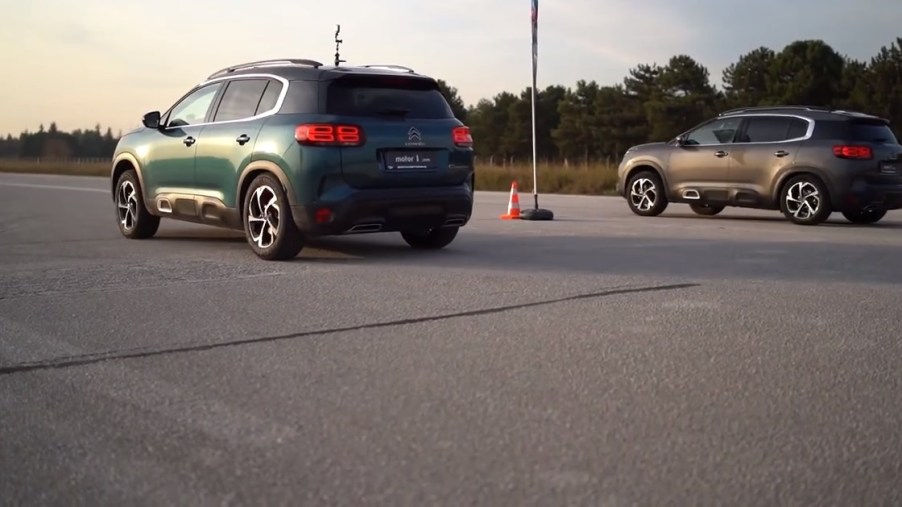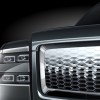
Is a Diesel SUV as Fast as a Gasoline One?
There’s an old adage that consumers buy horsepower, but drive torque. And when it comes to torque, it’s tough to beat a diesel SUV. Diesels can tow larger loads and are arguably more durable than gasoline engines—hence the popularity of importing diesel Land Cruisers and Hiluxes. The problem is, that high torque comes at the expense of horsepower. The new Jeep Wrangler 3.0-liter turbodiesel V6, for example, makes less power than the 2.0-liter turbocharged four-cylinder. But, does that mean a diesel SUV isn’t as quick as a gasoline SUV?
The difference between diesel SUVs and gasoline SUVs
Running on diesel fuel vs gasoline means changing several things about an SUV’s engine. While the basic components—pistons, engine block, crankshaft—are still the same, owners can’t just swap parts.
Diesel fuel explodes via compression, not ignition. As a result, diesel SUVs don’t have spark plugs. Instead, on cold days, they use glow plugs to warm the engine up. The high compression means diesel engines are more efficient. The pressures also mean manufacturers have to make the engine parts more robust, which is why diesels have a reputation for reliability.
Unfortunately, diesel SUVs have their drawbacks. Diesel combustion produces more soot, smog, and other air pollutants. That’s why diesel engines need specialized oil and DEF, to keep both their internals and the air clean. These engines also have their own special maintenance requirements and schedules. Then there’s the problem with how diesel engines work.
Diesels make more torque. Torque is a measure of how much force can be applied at a distance, like when you tighten a bolt using a wrench. As Heavy D’s Towing explains, torque is how much work you or your engine can do. The thermodynamics of compression-ignition means diesel SUVs can do more work, which is why they make more torque.
Horsepower, though, measures the ability to do work quickly. Horsepower is basically torque multiplied by rotation, which is why horsepower rises as engine revs climb. And, as Car Throttle explains, because diesel engines’ pistons have to move farther during each stroke, the engine can’t rev as high. Hence, why diesel SUVs make less power than gasoline ones.
However, just because a diesel SUV makes less horsepower doesn’t necessarily make it slower.
Citroen C5 diesel SUV vs gasoline SUV
Motor1’s Turkey team wanted to see if a diesel SUV was truly slower than a gasoline one. So, the team lined up two Citroen C5 SUVs for a number of comparison tests. And apart from the engines, the two SUVs were identical: same weight, tires, and wheels. One had a 1.5-liter turbodiesel four-cylinder, making 129 hp and 221 lb-ft. The other had a 1.6-liter turbocharged gasoline four-cylinder, producing 178 hp and 184 lb-ft.
There were 3 tests. The first was a 1000-meter drag race, followed by a rolling race from the 400-m mark to the 1000-m mark. Finally, the two SUVs performed a brake test, braking from 81 mph to 0.
Which is faster?
Short answer: the diesel SUV lost to the gasoline one. In both the standing-start and rolling drag races, the gasoline C5’s increased power let it pull ahead. However, the diesel did briefly hold its own.
The reason why we say that consumers buy horsepower, but drive torque, is that torque is what lets you accelerate off the line. That’s why Harley-Davidson doesn’t advertise horsepower, but torque output: as Cycle World explains, higher torque is what gets even heavy machines moving away from a stop quickly. And that’s why, in both the standing and rolling drag races, the diesel C5 kept pace with the gasoline C5 for a few seconds.
But, once the gasoline SUV’s engine starting revving higher and higher, it ultimately got away from the diesel one. And, although the diesel SUV won the braking test, that was largely a question of reaction time, rather than outright performance.
So, is a diesel SUV as fast as a gasoline one? It may be able to keep up for a short time, but ultimately, the answer is ‘no.’
Follow more updates from MotorBiscuit on our Facebook page.


